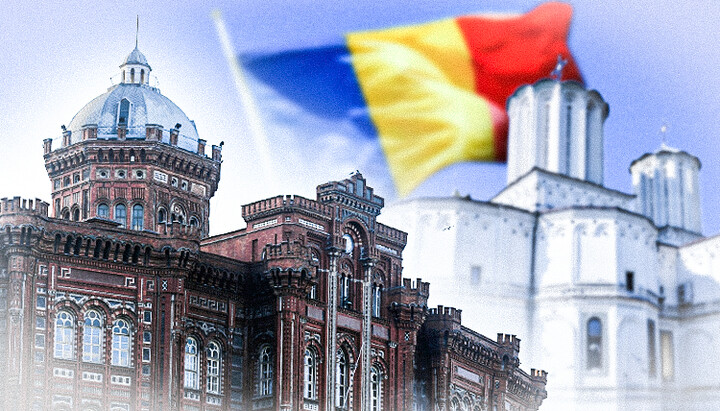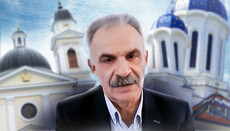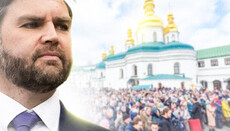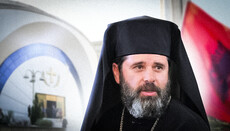Phanar and thе Romanian Church: Recognition of OCU in exchange for Moldova?

A Phanar hierarch visited Romania, where he declared the strengthening of ties between Constantinople and Romanian Patriarchates. What is behind these words in reality?
On August 11, 2023, Metropolitan Athenagoras of Belgium, the representative of the Patriarchate of Constantinople, declared the strengthening of ecclesiastical and canonical ties between the Phanar and the Romanian Church. At first glance, this seemingly unremarkable official statement could indicate new attempts by the Phanar to force Orthodox Churches to recognise the OCU. What makes us think so? Let's understand.
Moldova and the "Metropolis of Bessarabia"
Recently, Moldova has taken a firm course towards the independence of the Moldovan Orthodox Church from the ROC. The break from the Russian Orthodox Church is, to a large extent, an initiative of the country's authorities, pushed toward this decision by "Western" (particularly Romanian) partners.
For example, on February 11, 2022, during a joint session of the Moldovan and Romanian governments, the Prime Minister of Romania, Nicolae Ciucă, demanded that the Moldovan government support the "Bessarabian Metropolis".
During the same period, Ciucă visited the residence of the "Bessarabian Metropolis" in Chisinau where he met with members of its "Synod." They discussed the situation and dynamics of the institutions of the "Bessarabian Metropolis", talked about the need to improve Moldova's legislative framework in the field of worship to bring it in line with European norms, considered the issue of increasing Romanian government funds intended to support the clergy of the "Bessarabian Metropolis," and also discussed including the issue of the "Metropolis of Bessarabia" on the agenda of European organisations and institutions.
You would agree that all of this looks very similar to the phenomena we previously observed in Ukraine, first with respect to the UOC-KP and now with the OCU.
A few words must be said here about what the "Metropolis of Bessarabia" is.
It was founded by the Orthodox Church of Romania as an archdiocese in the territory of Bessarabia (now the Republic of Moldova). A number of hierarchs of the ROC who, after the 1917 revolution, chose not to be under the jurisdiction of the Romanian Patriarchate were forced to leave the country. After World War II, Patriarch Nicodim of Romania and Patriarch Alexy I of Moscow agreed to restore the jurisdiction of the Russian Orthodox Church over the Chisinau Eparchy.
In 1991, after the collapse of the USSR, the Chisinau Eparchy started talking about joining the Romanian Patriarchate. However, in 1992, a congress of Moldovan clergy decided to remain under the ROC. On September 14, 1992, a group of priests announced the reestablishment of the "Metropolis of Bessarabia" within the Romanian Patriarchate. This group was led by Bishop Peter Păduraru of Bălți, who had been banned from the priesthood by the ROC but was later accepted into the Romanian Church without a letter of release. Moscow stated that the Romanian actions were not canonical but did not break communication with the Romanian Patriarchate. The situation was left in a state of suspension, effectively resulting in two church jurisdictions operating in the territory of Moldova. The vast majority of parishes and priests remained with the Moldovan Orthodox Church, but the "Metropolis of Bessarabia" continued its efforts to achieve numerical growth.
With the emergence of the "OCU," these efforts gained significant support from the state.
The Moldovan Church and State
In 2022, some politicians in the country began accusing the Moldovan Church of supporting the idea of the "Russian world." For instance, a representative of the pro-presidential party of Moldova, "Action and Solidarity," Deputy Oazu Nantoi, referred to the Moldovan Church as the "bastion of the Russian world" and demanded that priests express themselves more clearly on a range of political issues, primarily the conflict in Transnistria (an analogous question to "Whose is Crimea?" posed to the priests of the UOC).
Later, the Moldovan press started publishing articles containing negative statements about the head of the Moldovan Church, Metropolitan Vladimir. Specifically, he was accused of participating in the ROC Synod at the beginning of October 2022 and then allegedly conducting a liturgy where a prayer for Putin was offered. Metropolitan Vladimir had to defend himself, stating that during the liturgy, he read a prayer for the healing of the sick and "never prayed for Putin".
However, he was "not believed", and pressure on the Moldovan Church intensified. In October 2022, the state channel of Moldova accused the Moldovan Church of supporting the "OCU" and stopped broadcasting their services.
In November, the Liberal Party of Moldova addressed the priests and parishioners of the Moldovan Metropolis, calling on them to transfer churches under the jurisdiction of the "Metropolis of Bessarabia", which is subordinate to the Moscow Patriarchate. The party leader even stated, "Metropolitan Vladimir's behaviour contradicts the national interests and the interests of the entire society."
The Role of the Romanian Patriarchate
However, on July 13, 2023, Patriarch Daniel and the Secretary of State for Relations with the Republic of Moldova (DRRM), Adrian Dupu, signed a Protocol of Cooperation that outlines a series of measures aimed at developing connections and strengthening the spiritual, cultural, and national identity of Romanians in Moldova. A priority area of collaboration, as stated in the document, is the "construction and repair of churches of the Bessarabian Metropolis".
Simultaneously, Patriarch Daniel requested that the Moldovan authorities return the buildings of the former Orthodox Theological Faculty and the former seminary in Chisinau for the use of the "Metropolis of Bessarabia". He called for the clergy of the "Bessarabian Metropolis to be allowed to provide religious assistance in the army, prisons, and hospitals, as well as to be invited to official events where clerics of the Moldovan Orthodox Church of the Moscow Patriarchate are typically invited”.
In other words, all of these facts indicate that there is very active work being done in Moldova to incorporate the Moldovan Church into the structure of the Romanian Patriarchate. Against this backdrop, the recent visit of a representative from the Constantinople Patriarchate to Moldova a few days ago can be considered quite illustrative.
The Price of Recognizing the OCU – Moldova?
On August 11, 2023, a representative of the Constantinople Patriarchate, Metropolitan Athenagoras of Belgium, arrived in the city of Targoviste to congratulate Metropolitan Niphon of Targoviste on the feast day of his heavenly patron. During the liturgy, the representative of the Phanar declared the strengthening of ecclesiastical and canonical ties between the Churches of Constantinople and Romania. He especially emphasised the need to strengthen the unity of Orthodox Christians around the world. It's worth noting that in the understanding of the Phanar, unity can only be achieved through the recognition of the OCU. What relation does the OCU have to the feast in Romania? Direct.
The fact that Metropolitan Niphon was chosen as a "link" between the Romanian Church and the Phanar is not accidental. Back in May 2019, a delegation of diplomats from the United States met with Romanian Patriarch Daniel to discuss matters of "expanding cooperation in the religious sphere." We know what is behind this "expansion": the promotion of OCU recognition.
Interestingly, apart from the Patriarch, the Americans led by Sam Brownback also specifically met with Metropolitan Niphon of Targoviste. During negotiations, Brownback stated that his visit to Romania aimed to "develop relations with the Orthodox world". He told Metropolitan Niphon that he had already visited Mount Athos, Greece, and Bulgaria, and after visiting Romania, he would head to the Republic of Moldova.
Furthermore, on October 22, 2021, Metropolitan Niphon of Targoviste attended as a guest a festive liturgy at St. George’s Church at the Phanar, which was held to commemorate the 30th anniversary of Patriarch Bartholomew's ascension to the patriarchal Throne. His neighbour in the stadia (wooden chairs in Greek churches) was "Bishop" Nestor Pysyk of the OCU. All the other hierarchs represented Greek-speaking Churches. Therefore, it is highly unlikely that the Phanar hierarch's visit to Metropolitan Niphon is merely a gesture of respect. It is very likely that the recognition of the OCU by the Romanian Church is at stake. The cost of this "recognition" could be assistance in the process of "transferring" the Moldovan Church into the "Metropolis of Bessarabia".
In addition to the aforementioned facts, there are several other indirect signs. For instance, two other hierarchs were present at the celebration in Targoviste: Metropolitan Nektarios of Kition of the Church of Cyprus and Bishop Veniamin of "South Bessarabia" (within the "Metropolis of Bessarabia"). Nectarios is known as the most ardent supporter of the OCU in Cyprus, and the presence of the bishop of "South Bessarabia" likely speaks for itself.
Thus, the Phanar continues its persistent and rather active work to promote the OCU. As we have previously noted, the Phanar is engaged in negotiations with Bulgarians and Macedonians regarding the Dumenko structure. And now, Romanians have been added to the "negotiation process".
There can be no doubt that with the help of "Western partners," the Moldovan government will support the Phanar. Considering what is happening in the global Orthodox world, the scenario where dissidents are repressed won't cause any resistance in the democratic society. Moldovan believers should be prepared for it. The Phanariots will do everything to turn the Russian Church solely into the Russian Orthodox Church. And it's not guaranteed that they won't succeed.









